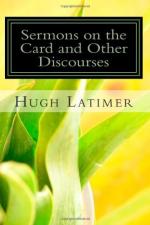Now, as touching the three other sentences, you must note and take heed, what difference is between these three manner of offences: to be angry with your neighbour; to call your neighbour “brainless,” or any such word of disdain; or to call your neighbour “fool.” Whether these three manner of offences be of themselves more grievous one than the other, it is to be opened unto you. Truly, as they be of themselves divers offences, so they kill diversly, one more than the other; as you shall perceive by the first of these three, and so forth. A man which conceiveth against his neighbour or brother ire or wrath in his mind, by some manner of occasion given unto him, although he be angry in his mind against his said neighbour, he will peradventure express his ire by no manner of sign, either in word or deed: yet, nevertheless, he offendeth against God, and breaketh this commandment in killing his own soul; and is therefore “in danger of judgment.”
Now, to the second part of these three: That man that is moved with ire against his neighbour, and in his ire calleth his neighbour “brainless,” or some other like word of displeasure; as a man might say in a fury, “I shall handle thee well enough;” which words and countenances do more represent and declare ire to be in this man, than in him that was but angry, and spake no manner of word nor shewed any countenance to declare his ire. Wherefore as he that so declareth his ire either by word or countenance offendeth more against God, so he both killeth his own soul, and doth that in him is to kill his neighbour’s soul in moving him unto ire, wherein he is faulty himself; and so this man is “in danger of council.”
Now to the third offence, and last of these three: That man that calleth his neighbour “fool,” doth more declare his angry mind toward him, than he that called his neighbour but “brainless,” or any such words moving ire: for to call a man “fool,” that word representeth more envy in a man than “brainless” doth. Wherefore he doth most offend, because he doth most earnestly with such words express his ire, and so he is “in danger of hell-fire.”
Wherefore you may understand now, these three parts of this card be three offences, and that one is more grievous to God than the other, and that one killeth more the soul of man than the other.
Now peradventure there be some that will marvel, that Christ did not declare this commandment by some greater faults of ire, than by these which seem but small faults, as to be angry and speak nothing of it, to declare it and to call a man “brainless,” and to call his neighbour “fool:” truly these be the smallest and the least faults that belong to ire, or to killing in ire. Therefore beware how you offend in any kind of ire: seeing that the smallest be damnable to offend in, see that you offend not in the greatest. For Christ thought, if he might bring you from the smallest manner of faults, and give you warning to avoid the least, he




